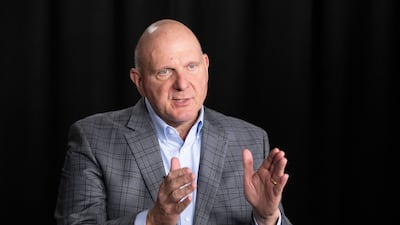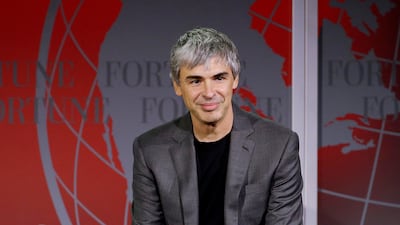The worst of the troubles for Adani Group may be over after a scathing report by a US short seller released a year ago triggered a crisis that rattled investors and wiped billions of dollars off the conglomerate's market value and its billionaire founder’s personal wealth.
Analysts say the situation seems to have turned a corner for chairman Gautam Adani and his group's recovery will continue in the days and weeks to come.
On Wednesday, India’s Supreme Court ruled a separate probe was not needed beyond the investigation being carried out by the country’s markets regulator, the Securities and Exchange Board of India (Sebi), following Hindenburg's allegations of financial wrongdoing.
“This may signal a turning point, potentially marking the end of the worst phase of the crisis and positively impacting the group’s standing and investor confidence,” says Nilesh Tribhuvann, founder and managing partner of White & Brief Advocates & Solicitors.
“The Adani Group has been proactive in its recovery, raising over $15 billion through equity and debt, regaining investor confidence and re-establishing its bankability.”
Sharda School of Business Studies
It has been a tough time for Mr Adani and his conglomerate – which has interests in sectors including ports, airports and energy – after Hindenburg last January alleged financial irregularities including stock market manipulation and improper use of tax havens.
The Adani Group has denied all the allegations but the accusations resulted in $150 billion being wiped off the market value of its companies at one point in their wake. Mr Adani also had tens of billions of dollars wiped off his personal wealth.
The matter even sparked a political row ahead of the general election due to be held this year, with the opposition accusing the government led by Prime Minister Narendra Modi of having favoured the Adani Group when it came to awarding contracts. The government and Mr Adani have denied the allegations.
The win in India’s apex court is a major milestone and its significance was reflected on Friday when Mr Adani managed to temporarily regain his position as Asia's richest man.
He overtook Reliance Industries' Mukesh Ambani as his net worth rose $7.7 billion in a single day to $97.6 billion on the Bloomberg Billionaires Index. The index on Sunday showed Mr Adani has since slipped back below Mr Ambani, with wealth at $94.5 billion. Mr Ambani's wealth stood at $97.5 billion. However, year-to-date Adani Group's founder has still managed to increase his net worth by more than $10 billion.

Mr Adani's relief at the Supreme Court judgment was clear from his post on the social media platform X, formerly Twitter, when he said “truth had prevailed”.
“Our humble contribution to India's growth story will continue,” he wrote.
Adani's stocks rallied last week on the news, with market experts expecting the companies to continue clawing back the lost ground, as they believe the group is now in a stronger position to regain investors' confidence.
Flagship Adani Enterprises ended the week up more than 5 per cent after the verdict. Adani Ports, India's largest private port operator, gained more than 12 per cent last week.
“We believe that the group is placed on a stronger footing from here on,” says Manish Chowdhury, head of research at StoxBox broker.
“The company has initiated several effective steps and worked on the profitability front, reduced leverage, enhanced the institutional outreach and has been at the forefront of effective communication with external shareholders.”
Adani has been on a charm offensive over the past year in an effort to regain investors' trust with roadshows and inviting bankers to tour its facilities.
While the conglomerate and Mr Adani have managed to recover most of their losses, they have not bounced back completely to the levels they were at before the crisis hit.
Mr Adani's wealth was at $118.9 billion on the Bloomberg Billionaires Index shortly before Hindenburg's report was published.
Adani Enterprises is down 25 per cent on its peak share price of more than 4,000 rupees ($48.09). The company's share price currently stands at 3,009 rupees as of market close on Friday.
The conglomerate's combined market capitalisation is still about $50 billion short of its levels before the crisis, Bloomberg has calculated.
While things are looking up, risks remain.
“The future is unpredictable, [but] if the group is able to properly handle this crisis, it may mark a turning moment,” says Hari Shankar Shyam, chairman of executive education at Sharda University's Sharda School of Business Studies.
“The capacity of the Adani organisation to manage its debt, keep investor trust and carry on with commercial operations without major setbacks are only a few of the variables that will determine how the organisation emerges from the crisis.”
So far the group has made major strides in dealing with the situation.
“Working on a recovery plan, the business has been aggressively adjusting its growth objectives, slowing down acquisitions, deleveraging and fortifying its financial sheet,” says Mr Shyam.
Despite the crisis, last year, the Adani Group managed to secure investments from GQG Partners, refinanced a $3.5 billion loan and outlined plans to invest $100 billion in green energy.

The group has continued with its diversification efforts, expanding in areas including media and artificial intelligence.
In another positive development for the conglomerate, Adani Ports on Wednesday said it would raise up to $600 million by selling debentures – a type of long-term business debt not secured by collateral.
There is still work to be done, however, as given the extent of Hindenburg's allegations, “some investors may choose to exercise caution”, Mr Shyam says.
Investors are still awaiting the conclusion of Sebi's probe into the Adani Group.
The Supreme Court has given the market regulator another three months to complete its investigation, having already extended the deadline twice. The Sebi in August told the court it had closed its inquiry into 22 of the 24 issues it was investigating related to the Adani Group.
Last year, India's apex court also set up an expert panel to investigate if there had been any regulatory lapses and the panel concluded there were none, with no conclusive evidence of manipulation of stock prices by the group.
The regulator has said it will take appropriate action based on the outcome of its inquiry.
“Once Sebi's report comes out in the remaining cases and if it comes out clean”, this will help to massively restore investor confidence in the Adani Group, says Niranjan Shastri, programme chairman at NMIMS Indore's School of Business Management.
There will be a continued “cautious approach” when it comes to the valuation of companies, he says.
Even before Hindenburg's report, some market analysts had expressed concerns about the valuations of Adani stocks and the conglomerate's levels of debt.
The Hindenburg matter has forced the group to work harder to “align its corporate strategy with the larger shareholders' interest”, Mr Chowdhury says.
Certainly, lasting lessons have been learnt.
“The lessons emphasise the paramount importance of good governance, due diligence for investors, realistic valuations for companies and regulatory vigilance,” says Mr Tribhuvann.
“We recognise the Adani crisis as an opportunity for corporate India, investors and regulators to enhance transparency, diligence and robust regulatory frameworks for a more resilient market environment.”










